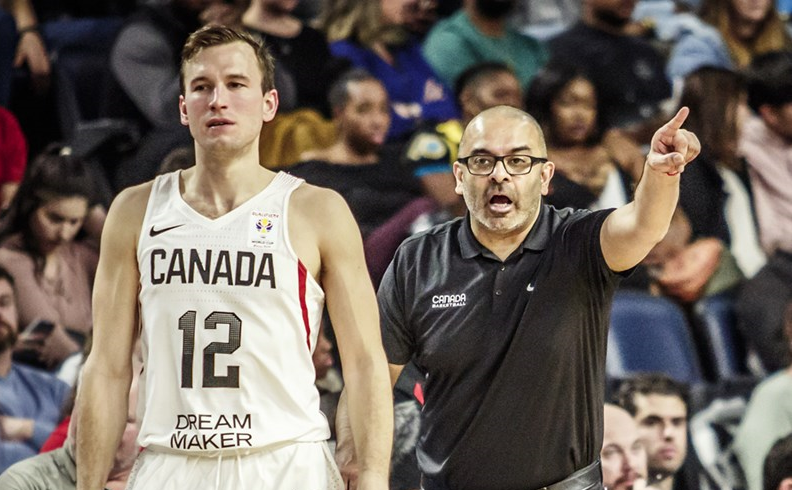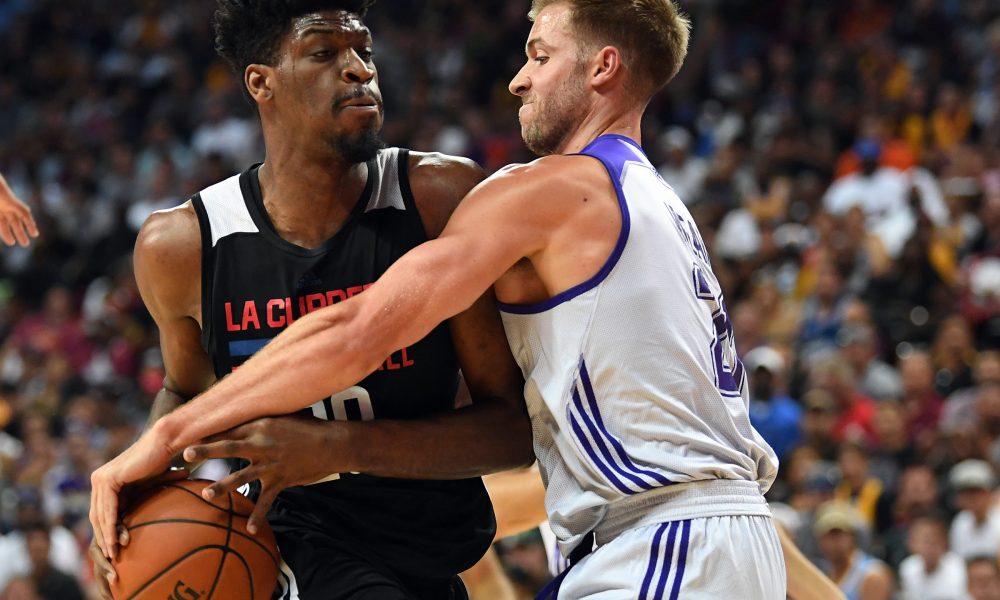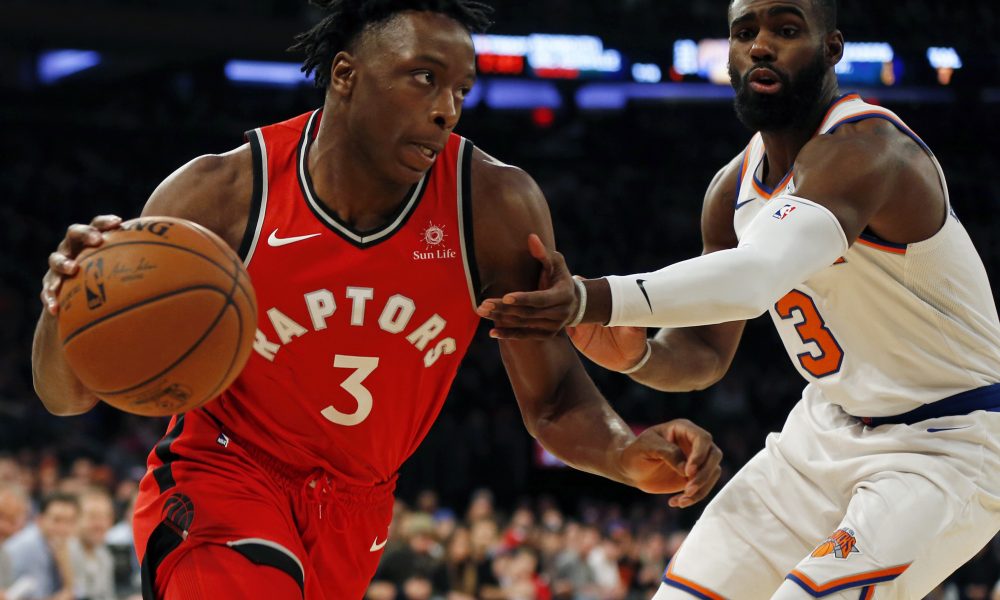Canada 76, Dominican Republic 88 | Box Score
Despite all of the momentum of basketball in Canada, things never seem to go smoothly for Canada Basketball’s senior men’s team for long.
The qualifying process for the 2019 FIBA World Cup couldn’t have started out much better for Canada than it did Friday, when they rolled Bahamas and looked like a potential threat, even without the benefit of NBA, NCAA, and EuroLeague players, to make noise in the Americas continent. Monday would bring more challenges, the Canadians squaring off away from home this time and doing so against a much more experienced Dominican Republic outfit that beat U.S. Virgin Islands (who beat Canada at the AmeriCup this summer) on the weekend. That proved too monumental a challenge in the team’s second game together, as they were largely run off the floor in Santiago de los Caballeros to the tune of 88-76.
The game got out to a bit of a slow start, the flow gummed up by a steady diet of early non-shooting fouls, sloppy turnovers, and some Dominican misses near the rim. Joel Anthony got things going with a mid-range push-shot, the game’s only scoring in the opening 100 seconds and Canada’s only field goal until Phil Scrubb sank a three over three minutes in, enough of a drought to have them behind 8-5 early on. Dominican had gameplanned for Brady Heslip better than Bahamas on Friday, when he hit six triples, staying in man coverage, selling out to contain him and looking to attack him at the other end of the floor, taking him out of the game and daring is teammates to beat them. It took Xavier Rathan-Mayes charging to the rim to get some offense going for the visitors, and even that proved only temporary.
Head coach Roy Rana looked to his bench for a boost and had to concede a timeout shortly after to figure things out (and drop a few expletives the broadcast caught), down 15-5 with ball control and foul issues keeping Canada from any kind of rhythm. The energy level picked up, if nothing else, and a number of second chances saw Dyshawn Pierre get on the board and Rana breathe a sigh of relief (Pierre being the only Canadian breaking through on offense was a running theme). An Olivier Hanlan bucket followed, and the Dominicans hit pause to prevent a more significant run. It didn’t really work, as Canada had settled in, improved their ball movement, and closed the 10-point gap to three by the end of the quarter despite shooting 39 percent with eight turnovers.
READ MORE: USports’ Steady Rise Is Helping Power the Growth of Canadian Basketball
The Dominican opted to stay fairly small even as some Canada’s starters filtered back in, and the Canadian starters once again lost the handle on the game. Their frigid shooting continued, putting them on the wrong end of an 14-4 run and leading Rana to try some new combinations. Grandy Glaze and Thomas Scrubb brought some nice energy, and both sides once again became fairly erratic in a messy back-and-forth stretch. Heslip’s cold shooting took away one of Canada’s primary weapons (he was 0-of-4 and 0-of-3 on threes in the half and was a minus-19, better than only Anthony Bennett), and Canada’s transition game couldn’t produce much off of turnovers, a glaring edge for the Dominican.
The deficit swelled to 14 at the half, and Canada had the difficult challenge of finding a sense of urgency while also settling down their frenetic play. The Dominicans, meanwhile, had a cushion and home court, led by Rigoberto Mendoza de la Rosa’s 13 points off the bench, as many as Canada’s top two scorers combined. The contrast to Friday at both ends for Canada was stark, at the same time disappointing in general and encouraging about how a second-half turnaround might look.
It didn’t go well out of the gate, with Rathan-Mayes missing Bennett in the corner out of bounds for yet another turnover. Bennett found Anthony for a layup shortly after, at least, only for turnovers to continue rearing their head. That led to some frustration, with Bennett picking up an unsportsmanlike foul and getting the hook, Canada’s deficit extending to 19 in the process. It kept pushing wider, with Eulis Baez helping anchor a stout defensive front that allowed Canada points almost strictly off of broken plays, scrambles, and second chances. To their credit, the Canadians hung around and played some active defense to try to mount a legitimate comeback, and Phil Scrubb even hit from outside to break through the lid on the basket. Still, the hole was so deep to climb out of, and Rana was left to find a way to make up 16 points in the fourth when his team hadn’t topped that mark for scoring in a quarter yet.
In a format like this, point differential matters, especially since first-round results carry over to the second round. When the Dominican stretched the lead to 24, then, there was still plenty at stake to play for, and Rana responded by trying to trap to get some sort of run going. Canada looked somewhat comfortable pressuring the ball like that but lost control of their own glass, surrendering back-to-back second-chance buckets. Heslip got on the scoresheet with a couple of threes, at least. It was difficult to find positives, and while emptying the bench for a late spark and mini-push would have been understandable, the main pieces got the nod given the importance of the final score and played a decent last couple of minutes.
To that end, Canada had managed to trim the final deficit to 12, leaving their point differential for the first stage of qualifiers at plus-12 (the Dominican is tops in the pool at 2-0 with a plus-22). The Canadians coughed up 22 turnovers, and while they shot much better as the game went along and did a great job grabbing their own misses, they were shaky on their own boards and allowed the Dominicans to shoot 49 percent. There’s work to do between stages, and doing that work will be a little difficult as everyone goes their separate ways for a few months.
Canada will now sit tight until February 22 and 25, when they’ll host the U.S. Virgin Islands and rematch with Bahamas on the road, respectively. The hope is surely that the roster will look quite similar, with the chemistry carrying over and no major changes to availability taking place. As a reminder, Canada has to finish in the top three of their four-team group (which wraps in early July) to move on to the second round next September through February 2019, and while they’re likely to push through, results here carry over, so every game is important.




